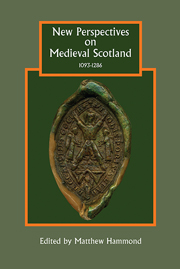Book contents
- Frontmatter
- Contents
- List of illustrations and tables
- List of contributors
- Acknowledgements
- Abbreviations
- Maps
- 1 Introduction: The paradox of medieval Scotland, 1093–1286
- 2 The Scottish ‘political community’ in the reign of Alexander II (1214–49)
- 3 Homo ligius and unfreedom in medieval Scotland
- 4 Scottish royal government in the thirteenth century from an English perspective
- 5 Neighbours, the neighbourhood, and the visnet in Scotland, 1125–1300
- 6 Cistercian identities in twelfth- and thirteenth-century Scotland: the case of Melrose Abbey
- 7 The language of objects: material culture in medieval Scotland
- 8 Structuring that which cannot be structured: a role for formal models in representing aspects of medieval Scotland
- Bibliography
- Index
- STUDIES IN CELTIC HISTORY
1 - Introduction: The paradox of medieval Scotland, 1093–1286
Published online by Cambridge University Press: 05 August 2013
- Frontmatter
- Contents
- List of illustrations and tables
- List of contributors
- Acknowledgements
- Abbreviations
- Maps
- 1 Introduction: The paradox of medieval Scotland, 1093–1286
- 2 The Scottish ‘political community’ in the reign of Alexander II (1214–49)
- 3 Homo ligius and unfreedom in medieval Scotland
- 4 Scottish royal government in the thirteenth century from an English perspective
- 5 Neighbours, the neighbourhood, and the visnet in Scotland, 1125–1300
- 6 Cistercian identities in twelfth- and thirteenth-century Scotland: the case of Melrose Abbey
- 7 The language of objects: material culture in medieval Scotland
- 8 Structuring that which cannot be structured: a role for formal models in representing aspects of medieval Scotland
- Bibliography
- Index
- STUDIES IN CELTIC HISTORY
Summary
It is not the least of the paradoxes in the history of the British Isles that it was in the kingdom of the Scots – the very area in which the English kingship did not directly impose its military and political power and in which English settlers and institutions were absorbed comfortably into the existing society and polity – that the English language and with it English culture arguably made its greatest and most enduring advances in the twelfth and thirteenth centuries.
It was this quotation from Rees Davies's masterful The First English Empire: Power and Identities in the British Isles 1093–1343 (2000) that first gave voice to the notion of the ‘paradox of medieval Scotland’, a notion which we took as the title of the project that led to this book. Davies was concerned with showing that an expansive socio-cultural and linguistic ‘Anglicisation’ was harnessed by the Anglo-Norman and Angevin kings to establish a ‘first English empire’ across Britain and Ireland in the central middle ages. Tempered by a hard-edged ethnic worldview which cast the Celtic-speaking peoples of Wales, Ireland, and Scotland as backward and uncivilised, this expansion was ultimately the victim of its own paradox, resulting in an incomplete conquest and fourteenth-century ‘ebb tide’ which left behind messy bifurcated societies in Wales and Ireland and lingering ethnic prejudice everywhere. Davies described this process of Anglicisation as the British Isles's experience of the much wider phenomenon of Europeanisation, which Robert Bartlett had recently outlined.
- Type
- Chapter
- Information
- New Perspectives on Medieval Scotland, 1093-1286 , pp. 1 - 52Publisher: Boydell & BrewerPrint publication year: 2013



